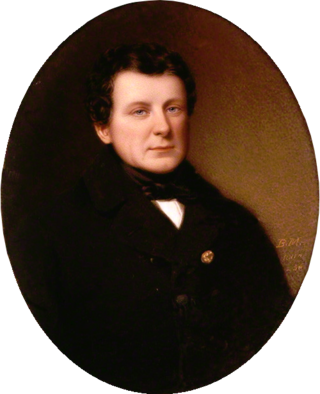Related Research Articles

Daniel(I) O’Connell, hailed in his time as The Liberator, was the acknowledged political leader of Ireland's Roman Catholic majority in the first half of the 19th century. His mobilisation of Catholic Ireland, down to the poorest class of tenant farmers secured the final instalment of Catholic emancipation in 1829 and allowed him to take a seat in the United Kingdom Parliament to which he had been twice elected.

This section of the Timeline of Quebec history concerns the events in British North America relating to what is the present day province of Quebec, Canada between the time of the Constitutional Act of 1791 and the Act of Union 1840.

Thomas Spring Rice, 1st Baron Monteagle of Brandon, was a British Whig politician, who served as Chancellor of the Exchequer from 1835 to 1839.

The 1835 United Kingdom general election was called when Parliament was dissolved on 29 December 1834. Polling took place between 6 January and 6 February 1835, and the results saw Robert Peel's Conservatives make large gains from their low of the 1832 election, but the Whigs maintained a large majority.

Colonel Richard Martin, was an Irish politician and campaigner against cruelty to animals. He was known as "Humanity Dick", a nickname bestowed on him by King George IV. He succeeded in getting the pioneering Cruel Treatment of Cattle Act 1822, nicknamed 'Martin's Act', passed into British law.

Sir Charles Gavan Duffy, KCMG, PC, was an Irish poet and journalist, Young Irelander and tenant-rights activist. After emigrating to Australia in 1856 he entered the politics of Victoria on a platform of land reform, and in 1871–1872 served as the colony's 8th Premier.

The Roman Catholic Relief Act 1829, also known as the Catholic Emancipation Act 1829, removed the sacramental tests that barred Roman Catholics in the United Kingdom from Parliament and from higher offices of the judiciary and state. It was the culmination of a fifty-year process of Catholic emancipation which had offered Catholics successive measures of "relief" from the civil and political disabilities imposed by Penal Laws in both Great Britain and in Ireland in the seventeenth, and early eighteenth, centuries.

The 1830 United Kingdom general election was triggered by the death of King George IV and produced the first parliament of the reign of his successor, King William IV. Fought in the aftermath of the Swing Riots, it saw electoral reform become a major election issue. Polling took place in July and August and the Tories won a plurality over the Whigs, but division among Tory MPs allowed Earl Grey to form an effective government and take the question of electoral reform to the country the following year.
Dungarvan was a parliamentary constituency in Ireland, which from 1801 to 1885 returned one Member of Parliament (MP) to the House of Commons of the Parliament of the United Kingdom.
Joseph Devonsher Jackson PC was an Irish Conservative MP in the United Kingdom Parliament and subsequently a High Court Judge.
The Irish Confederation was an Irish nationalist independence movement, established on 13 January 1847 by members of the Young Ireland movement who had seceded from Daniel O'Connell's Repeal Association. Historian T. W. Moody described it as "the official organisation of Young Ireland".
William Trant Fagan was an Irish writer and Member of Parliament (MP) from Cork.
Edward Sheil was Irish nationalist politician. He was a Member of Parliament (MP) for Athlone from 1874 to 1880, for Meath from 1882 to 1885, and for South Meath from 1885 to 1892, taking his seat in the House of Commons of the United Kingdom of Great Britain and Ireland.
Philip Cecil Crampton PC was a judge, politician and Solicitor-General for Ireland. He was also a noted supporter of the cause of total abstinence from alcohol.
John Henry North was an Irish barrister, judge and Canningite Tory Member of Parliament (MP) in the United Kingdom Parliament.
Admiral Theobald Jones, also known as Toby Jones, was an Irish officer in the British Royal Navy, a Tory politician, a noted lichenologist, and a fossil-collector. The County Londonderry-born son of a Church of Ireland clergyman, Jones was descended from a 17th-century Welsh settler in Ireland. Several generations of his family had held public office in the Kingdom of Ireland, including membership of the pre-union Parliament of Ireland.
Dominick Ronanye was an Irish politician.
Andrew Carew O'Dwyer was an Irish politician.
William Joseph O'Neil Daunt was an Irish politician and writer.
John William Power, sometimes described as the 17th Baron Le Power and Coroghmore, was an Irish politician.
References
- ↑ "Great Britain". Galignani's Messenger. 10 February 1827. Retrieved 1 December 2023.
- ↑ O'Connell, Maurice (1972). The Correspondence of Daniel O'Connell: 1833-1836. Irish University Press. ISBN 9780905471013.
- ↑ Stenton, Michael (1976). Who's Who of British Members of Parliament. Vol. 1. Hassocks: Harvester Press. p. 209. ISBN 0855272198.
- ↑ "Bail Court". The Legal Guide. 23 November 1839.